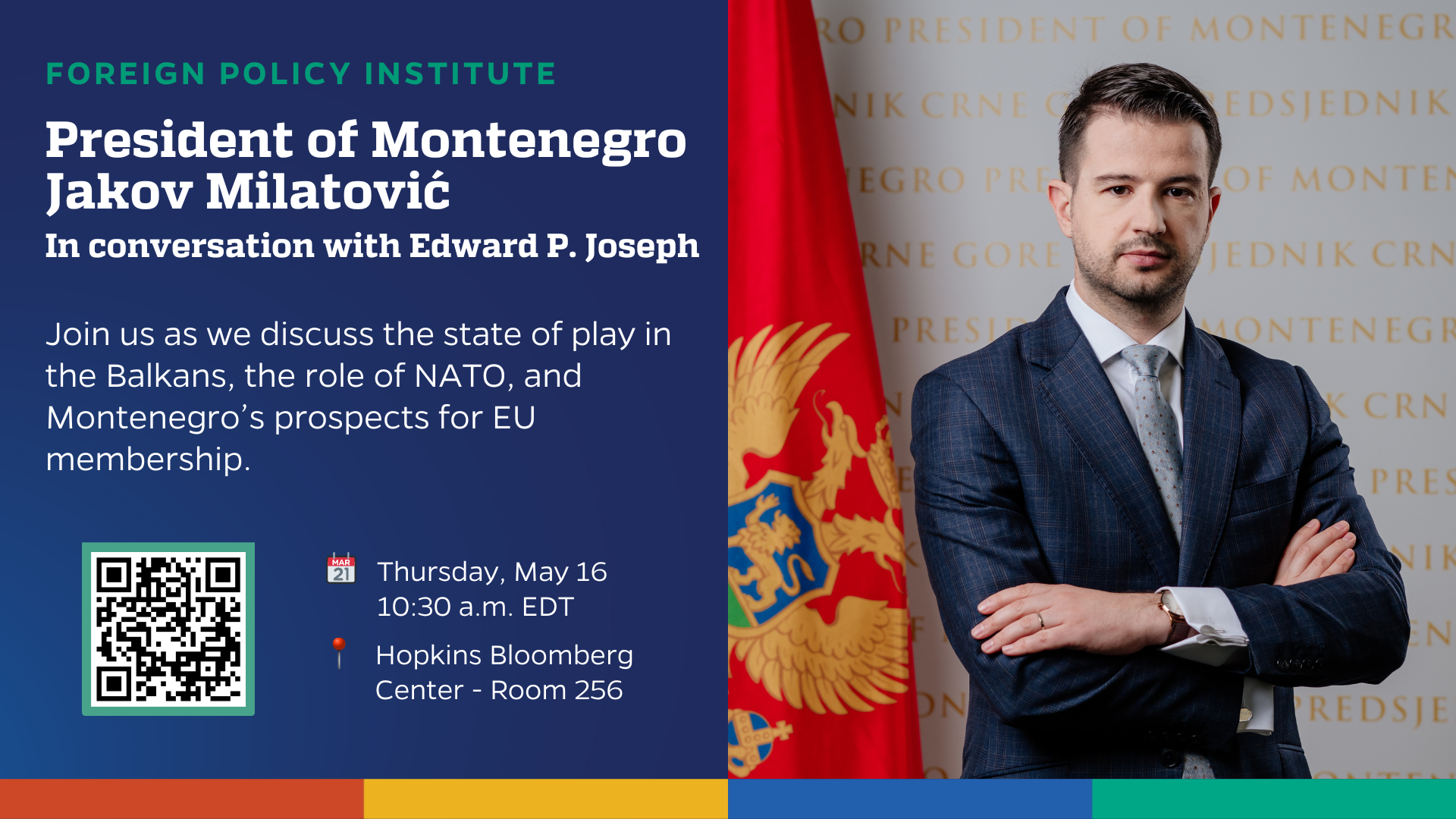Join the Foreign Policy Institute at the Johns Hopkins School of International Studies as in a discussion between Jakov Milatović, President of Montenegro, and Edward P. Joseph, FPI Senior Fellow, about the state of play in the Balkans, the role of NATO, and Montenegro’s prospects for EU membership.
Hopkins Bloomberg Center, 555 Pennsylvania Ave, Room 256
Please register on Eventbrite to attend in person.
About the Speakers
Jakov Milatović was born in Podgorica on December 7, 1986.
He completed primary, secondary school and faculty in Podgorica. As a US government scholarship holder, he spent one academic year at Illinois State University. After that, he spent one semester at Vienna University of Economics and Business (WU Wien) as a scholarship holder of the Austrian Government. Under the auspices of the European Commission, he spent one year of study at La Sapienza University in Rome. He earned his master's degree in the field of economics at the University of Oxford and he was also awarded a scholarship by the British Government.
He attended programs organized by the United Nations in New York, German Konrad Adenauer Foundation, Embassy of Montenegro in Rome and Office for International Cooperation of the Faculty of Economics in Podgorica. He also attended the Oxbridge Academic Program at Oxford, and a number of International Monetary Fund (IMF) Programs in London, as well as London School of Economics (LSE) Programs. He also trained at the University of Beijing, University of Belgrade and Leadership Academy of Stanford University. He worked in the banking sector in the country and abroad. In the sector for economic and political analysis at the European Bank for Reconstruction and Development (EBRD), he dealt with the economic analysis of the region of Southeast Europe and countries of the Western Balkans. He worked in Bucharest as the EBRD's Chief Economic Analyst for Romania, Croatia, Slovenia and Bulgaria from 2018 to 2020.
In the fall of 2022, he was a guest lecturer at the Luxembourg Business School. He is the author of several professional papers and co-author of two books.
He was elected Minister of Economic Development in the 42nd Government of Montenegro in December 2020. In June 2022, he founded the Europe Now Movement! and he is one of the leaders of that movement. After the success of the electoral list he led in the local elections in Podgorica, he ran in the presidential elections. He assumed the office of President of Montenegro on May 20, 2023.
He speaks English, Italian and Spanish.
He is married and father of three children.
Edward P. Joseph is a Senior Fellow at the Foreign Policy Institute and Adjunct Lecturer at SAIS, specializing in Conflict Management. Edward served on the ground in the Balkans for a dozen years, including during the conflicts in each war-affected country: Bosnia-Herzegovina, Croatia, Kosovo, and then-Macedonia.
In 2012, as the US-nominated Deputy Head of the OSCE Mission in Kosovo, Edward negotiated the breakthrough agreement with Pristina and Belgrade to hold Serbian elections in independent Kosovo.
In July 1995, Edward and one UN colleague coordinated the evacuation of Zepa, close to neighboring Srebrenica.
In 1995-1996, Edward deployed with the NATO Implementation Force in Bosnia-Herzegovina as a US Army officer. He is a veteran and former Army helicopter pilot.
Edward has authored dozens of articles and reports on the region, including in SAIS Review. His June 2023 Foreign Policy article, ‘The United States is Creating a Kosovo Crisis’ described the overlooked obstacle to establishing autonomy for Kosovo Serbs. Edward was the lead author on the January 2021 SAIS-Wilson Center report explaining how the European non-recognizers (of Kosovo) stymie the entire region, and setting out a corrective strategy.
Edward has led and currently serves on the Board of the National Council on US-Libya Relations. Edward earned his J.D. at the University of Virginia School of Law, and his B.A. and M.A. from Johns Hopkins University, and its School of Advanced International Studies.
